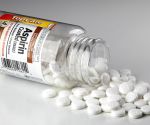- allergy to aspirin
- tendency to bleed
- recent bleeding from your digestive tract
- active liver disease
- under 21 years of age
Teens and children with fevers should never take aspirin. A life-threatening disease called Reye's syndrome may result. Reye's syndrome harms the brain and liver and can quickly lead to death. This is especially true if they have chicken pox or possible flu.
Do not take aspirin if you have a known allergy to it or to other medications from the class called nonsteroidal anti-inflammatory drugs (NSAIDs). If you have a clotting disorder like hemophilia or have recently experienced bleeding of the intestines or stomach, avoid aspirin.
Only take aspirin under medical advice if you have gout, seasonal allergies, asthma; nasal polyps; ulcers of the stomach; or any diseases of the kidneys, liver, or cardiovascular system (including high blood pressure). If your doctor has advised you to use aspirin for preventing further strokes or heart attacks, do not take ibuprofen except if and how your physician directs. If you are about to have surgery, you may need to temporarily discontinue aspirin.
Do not use aspirin during the first two trimesters of pregnancy or while breastfeeding unless you discuss this with your doctor and the benefits outweigh the risks. Especially at higher dosages, aspirin and other NSAIDs should not be taken in the third trimester of pregnancy because they can cause heart problems and low weight for the fetus and bleeding and other complications of labor and delivery.
Continue Learning about Aspirin
Important: This content reflects information from various individuals and organizations and may offer alternative or opposing points of view. It should not be used for medical advice, diagnosis or treatment. As always, you should consult with your healthcare provider about your specific health needs.





